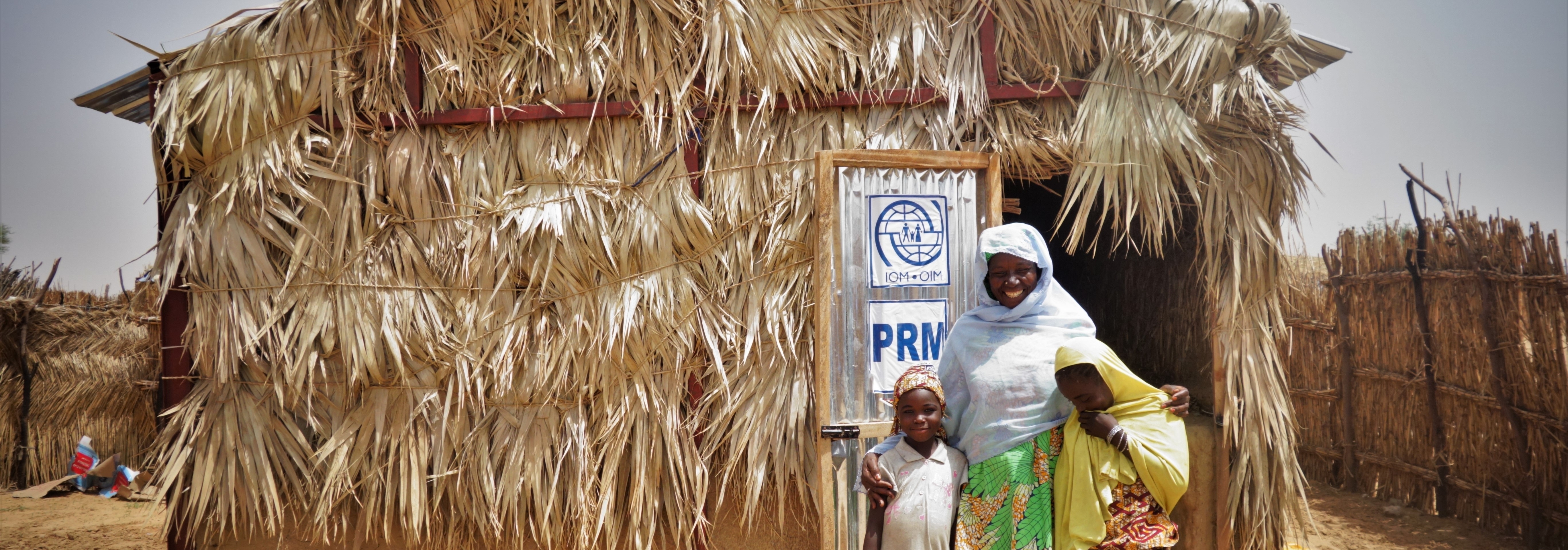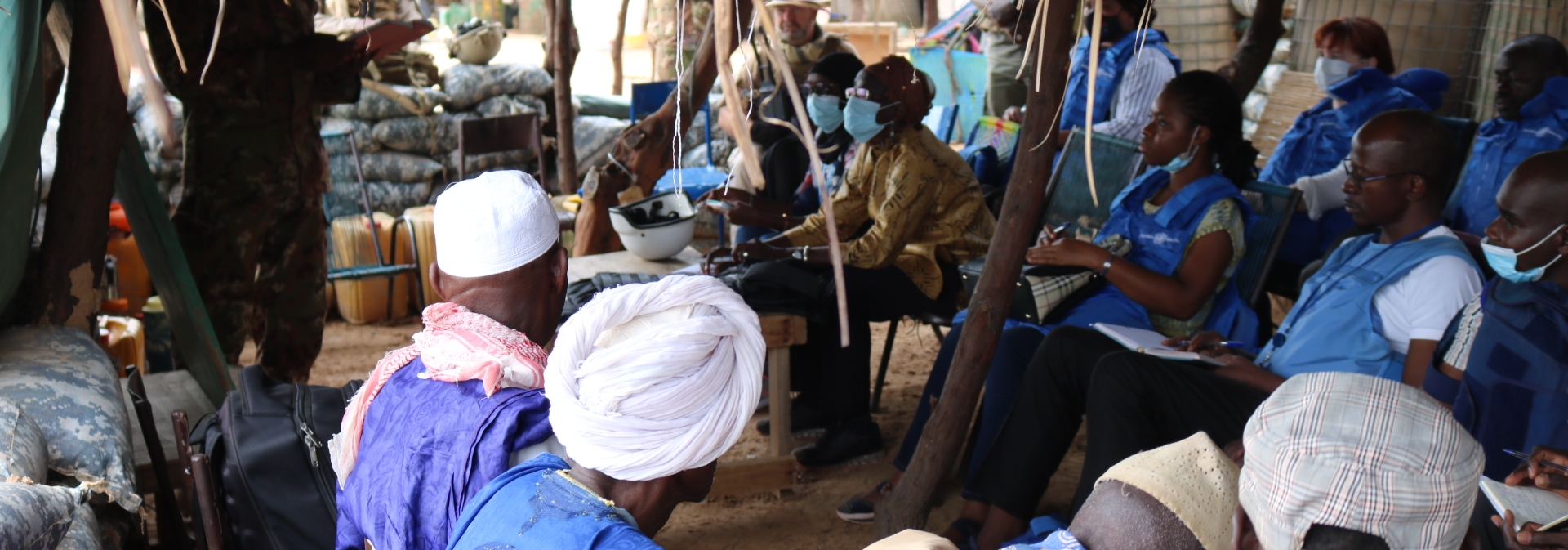IOM Vision
As part of its efforts to engage in the responses in the Central Sahel region, the International Organization for Migration (IOM) has been scaling up its operations in Burkina Faso, Mali and Niger to provide life-saving support to displaced and vulnerable persons affected by the growing crises, while seeking to reduce conflict drivers across the region, and prevent the expansion of the conflict into bordering regions and countries. IOM is responding to both the humanitarian and governance priorities in providing assistance and protection to affected and displaced communities, while also addressing the structural causes of instability in affected areas, maintaining a specific regional focus on cross-border fragility/dynamics.
Objective
Saving lives and protecting people on the move
IOM’s assistance will target all those affected by the crisis and disasters related to natural hazards, including those forcibly displaced and their host communities as well as returnees. Groups with specific needs will receive particular attention and assistance tailored to their needs.
|
IOM’s proposed response in Camp Coordination and Camp Management (CCCM) in Central Sahel will be aimed at displaced households settled in formal camps, spontaneous sites and collective centers as well as large groups of IDPs living in host communities and urban centers that could benefit from the services. IOM plans to:
|
|
IOM aims to ensure that conflict-affected vulnerable populations have access to adequate health assistance. In particular in all three countries, IOM plans to:
|
|
Given the nature of the crisis in the region, it has been generally observed that there are emotional and relational impacts within the population including fear, distrust and a reduction of social interactions. Based on its global approach as described in its Manual on Community-Based Mental Health and Psychosocial Support (MHPSS) in Emergencies and Displacement, and in the context of inter- and intracommunal violence and associated displacement in the Liptako Gourma region, IOM will offer direct MHPSS services and activities in all three countries, in particular:
As the lead agency of the MHPSS working group in Burkina Faso, IOM will continue ensuring the coordination of all actors providing mental health and psychosocial support and contributing to advising the humanitarian country team (HCT) on this critical topic. |
|
IOM’s protection activities will contribute to upholding the rights of displaced and affected populations in Burkina Faso, Niger and Mali and include:
GBV and protection will also be mainstreamed throughout all IOM emergency related activities. |
|
IOM will conduct water, sanitation and hygiene activities for the benefit of affected and displaced communities, in coordination with the WASH sector, notably:
|
|
With over 2.3 million people displaced in Central Sahel, emergency and transitional shelter and Non-Food Items (NFIs) assistance is a priority need in the three countries. The fact that the vast majority of IDPs are staying in host communities is putting strong pressure on already vulnerable communities which is increasing tensions among groups. Other hosting environments include urban centers, formal and informal sites and collective centers. IOM will:
|

Objective
Driving solutions to displacement
|
To address the root causes of conflict and impact of the crisis, IOM will assist populations affected by conflicts or vulnerable to conflict dynamics through various transition and recovery interventions. |
|
IOM will apply its substantial experience in community stabilization to support the restoration of basic rights and essential services for vulnerable people, while promoting functioning governance, reinforcing access to economic opportunities, and enhancing social cohesion among communities. This will be done to address the root causes and effects of the crisis, restore trust among community members, vulnerable populations and local authorities and lay the foundations for durable solutions, lasting peace and sustainable development. Activities will include:
|
|
IOM, together with humanitarian, development and private sector partners, will promote self-reliance approaches including a wide range of support tailored to individuals, households and communities, in particular to mitigate the detrimental impacts of prolonged displacement situations, accompany displaced people towards voluntary return, wherever possible, and revitalize local economies towards interim or longer-term solutions, in alignment with IOM’s framework for the Progressive Resolution of Displacement Situations (PRDS). This will be achieved through:
|
|
To promote peace in Central Sahel, IOM will support the transitioning of communities out of conflict, notably through community-based conflict management, providing support to community reconciliation processes intended to mitigate the drivers of conflict, complementing and supporting IOM's transhumance work and related activities under the West and Central African Transhumance Crisis Response Plan 2022. Activities will notably target the most vulnerable youth while building their sense of purpose. Interventions will include:
|
Objective
Strengthen preparedness and reduce disaster risk
IOM will support national and local authorities to reinforce preparedness and disaster risk reduction and will assist those communities most-at-risk of disasters and disease outbreaks, including at points of entry.
|
In line with the Sendai Framework for Disaster Risk Reduction (DRR) 2015–2030 and underpinned by broad multi-stakeholder engagement, IOM’s DRR efforts in Central Sahel will include:
As part of its co-leading role of the Capacity for Disaster Reduction Initiative (CADRI) for West and Central Africa, supporting activities in all three countries, notably multi-hazard risk assessments, the development of early warning systems, sensitization campaigns and establishment of community- disaster risk management systems, with a specific focus on floods and droughts. |
|
IOM will boost its preparedness efforts in all three countries as well as support authorities’ efforts and communities, in Niger and Burkina Faso, through:
|
Objective
Contribute to an evidence-based and efficient crisis response system
IOM’s support services such as the Displacement Tracking Matrix will benefit multiple Governments’ entities and humanitarian agencies that will be able to plan their humanitarian response and recovery interventions based on information on population movements and their related needs.
|
IOM gradually introduced its Displacement Tracking Matrix (DTM) in all three countries, starting in Mali in 2012, by deploying Mobility Tracking assessments, Multisectoral Site Assessments and Household Surveys. IOM has been collecting key information on displaced and returned populations, including numbers and locations, living conditions and access to services, sectoral needs, and durable solutions, thereby providing vital data to inform government and humanitarian partners’ provision of tailored and effective humanitarian assistance and protection services. Across the Central Sahel countries, IOM supports collective evidence-based decisions-making through its implementation of the following data collection exercises:
|
Mali, Burkina Faso, Niger
The map used here is for illustration purposes only. Names and boundaries do not imply official endorsement or acceptance by IOM.
Figures are as of 31 December 2023. For more details of IOM's operational capacity in country, please see the IOM Capacity section.


















